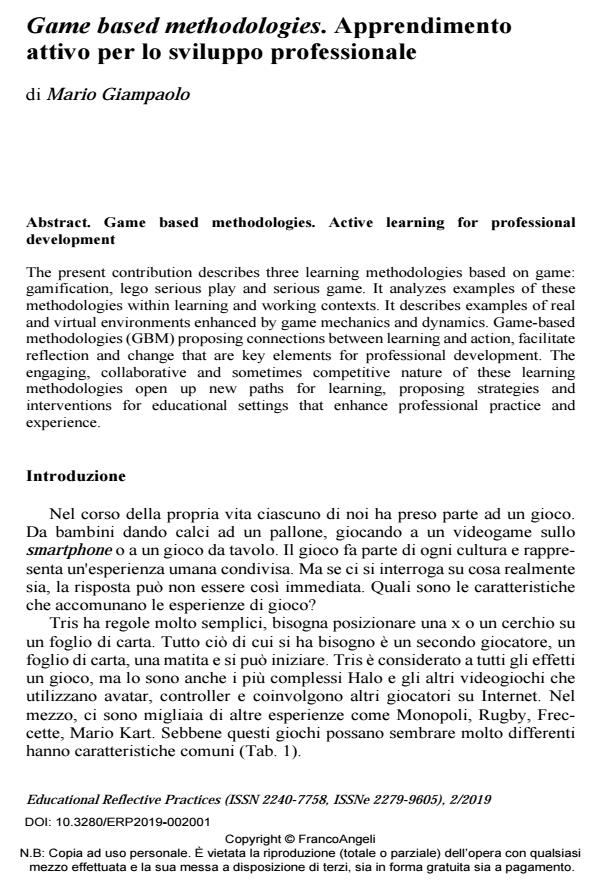Game based methodologies. Apprendimento attivo per lo sviluppo professionale
Titolo Rivista EDUCATIONAL REFLECTIVE PRACTICES
Autori/Curatori Mario Giampaolo
Anno di pubblicazione 2020 Fascicolo 2019/2 Lingua Italiano
Numero pagine 14 P. 5-18 Dimensione file 354 KB
DOI 10.3280/ERP2019-002001
Il DOI è il codice a barre della proprietà intellettuale: per saperne di più
clicca qui

FrancoAngeli è membro della Publishers International Linking Association, Inc (PILA)associazione indipendente e non profit per facilitare (attraverso i servizi tecnologici implementati da CrossRef.org) l’accesso degli studiosi ai contenuti digitali nelle pubblicazioni professionali e scientifiche
;
- Gee J. P. (2005). Learning by design: Good video games as learning machines. E-learning and Digital Media, 2(1): 5-16.
- Kapp K. M. (2012). The Gamification of Learning and Instruction. San Francisco: John Wiley & Sons.
- Abt C. C. (1987). Serious games. University press of America.
- Bertolo M., & Mariani I. (2014). Game Design Gioco e giocare tra teoria e progetto. Milano: Pearson.
- Bruner J. S. (1966). Toward a Theory of Instruction. Cambridge: Harvard University Press.
- de Freitas S. I. (2006). Using games and simulations for supporting learning. Learning, Media and Technology, 31(4): 343-58.
- Deterding S., Sicart M., Nacke L., O’Hara K., & Dixon D. (2011, May). Gamification. Using game-design elements in non-gaming contexts. In: CHI’11 extended abstracts on human factors in computing systems (pp. 2425-2428). ACM.
- Deterding S. (2012). Gamification: designing for motivation. Interactions, 19(4): 14-17.
- Dichev C., & Dicheva D. (2017). Gamifying education: what is known, what is believed and what remains uncertain: a critical review. International journal of educational technology in higher education, 14(1): 9.
- Fabbri L. (2017). L’agire riflessivo. In: Bochicchio P.R. F. (a cura di). L’agire organizzativo (pp. 147-162). Brescia: Editrice Morcelliana.
- Fabbri L., & Melacarne C. (2016). Didattica dell’innovazione e innovazione didattica. L’apprendimento come condizione per il cambiamento. In: Coinvolgere per apprendere. Metodi e tecniche partecipative per la formazione (pp. 319-339). Pensa Multimedia.
- Kiili K. (2005). Digital game-based learning: towards an experiential gaming model. The Internet and Higher Education, 8: 13-24.
- Kolb D. A. (1984). Experiential learning: experience as the source of learning and development. Englewood Cliffs, N.J.: Prentice-Hall.
- Laamarti F., Eid M., & Saddik A. E. (2014). An overview of serious games. International Journal of Computer Games Technology, 11.
- Oxland K. (2004). Gameplay and Design. Harlow: Addison-Wesley.
- Salen K., & Zimmerman E. (2004). Rules of play: Game design fundamentals. Boston: MIT Press.
- Schell J. (2010), speaks at DICE 2010 Las Vegas “Beyond Facebook”. Recuperato da https://www.realtimetranscription.com/showcase/DICE2010/JesseSchell/index.php.
- Schön D. (1971). Beyond the stable state: Public and private learning in a changing society. London: Temple Smith.
- Soucy K. (2018). Using LEGO® Serious Play® in UX Research My notes from the NH UXPA March 2018 Meeting. -- Recuperato da https://medium.com/@ksoucy/using-lego-serious-play-in-ux-research-287296d86204.
- Susi T., Johannesson M., & Backlund P. (2007). Serious games: An overview. The American Surgeon, 73: 1039-1063.
- Whitton N. (2010). Learning with Digital Games. A practice guide to engaging students in higher education. New York: Routledge.
Mario Giampaolo, Game based methodologies. Apprendimento attivo per lo sviluppo professionale in "EDUCATIONAL REFLECTIVE PRACTICES" 2/2019, pp 5-18, DOI: 10.3280/ERP2019-002001